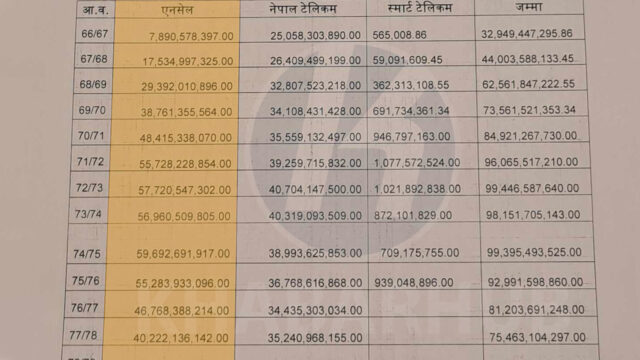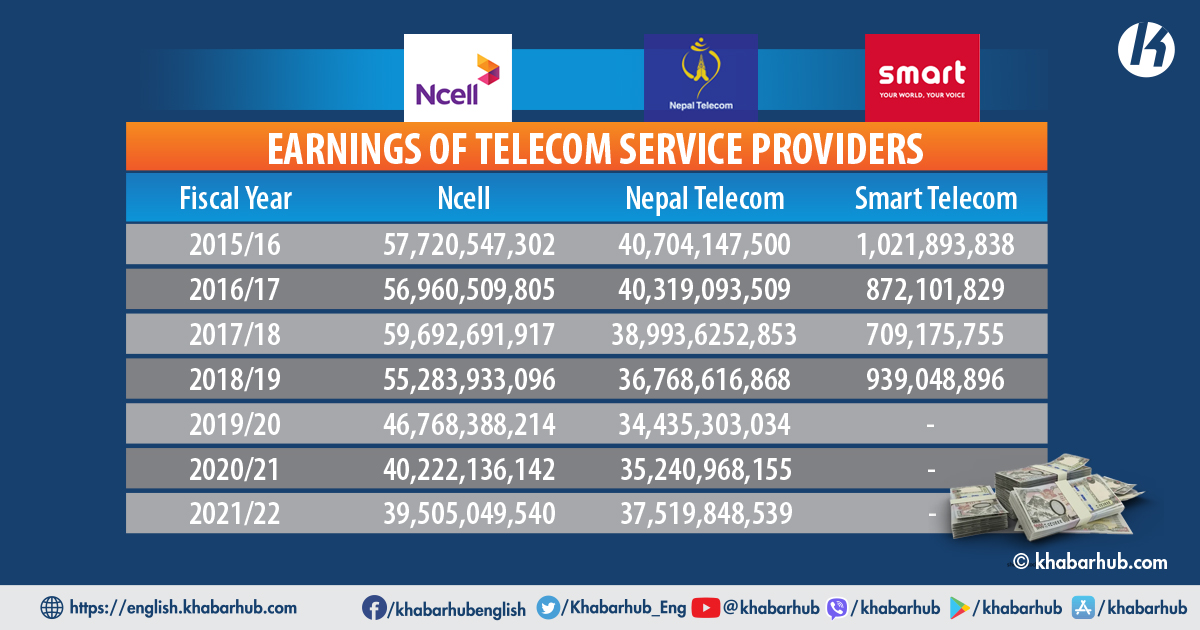KATHMANDU: Recent developments have thrust Ncell, a prominent private telephone service provider, into controversy following the withdrawal of investment by Malaysia’s Axiata Group.
The move has sparked speculation about Ncell’s financial health, with claims that the withdrawal is a response to continuous losses.
However, a comprehensive examination of Ncell’s income over the past 13 years reveals a more nuanced picture.
Khabarhub.com has meticulously gathered income statements for Ncell, Nepal Telecom, and Smart Telecom during this period.
In the fiscal year 2009/10, the government-owned Nepal Telecom recorded an annual income of Rs 25 billion, while Ncell’s earnings stood at Rs 7 billion 89 million.
Thirteen years later, Ncell’s annual income surged, surpassing that of Nepal Telecom by a significant margin.
The exact figures of Ncell’s earnings from Nepal during this period are yet to be disclosed.
Moving to the fiscal year 2010/11, Ncell experienced substantial growth, with its annual income escalating from Rs 7 billion to 17 billion.
Meanwhile, Nepal Telecom’s income saw a modest increase of Rs 1 billion, reaching Rs 25 billion.
The income gap between Ncell and Nepal Telecom was approximately Rs 18 billion. Remarkably, within a year, this gap narrowed significantly to just Rs 9 billion.
Similarly, in 2022, Axiata garnered 52.7 billion from Bangladesh and 2.92 billion from Indonesia, with no decline in the 6 billion profit from Malaysia.
In the fiscal year 2011/12, Ncell continued its impressive financial performance, with annual income soaring from 17 billion to 29 billion.
Nepal Telecom’s income also saw growth, climbing from Rs 26 billion to 32 billion. The competitive margin between the two companies shrank to Rs 3 billion.
Notably, this was the last year in which state-owned Nepal Telecom outperformed Ncell.
The ongoing financial dynamics raise questions about the future trajectory of telecom revenue in Nepal, especially with the recent withdrawal of investment and the evolving landscape of the telecommunications industry.
In the fiscal year 2012/13, Ncell reported a robust income of 38.76 billion, surpassing Nepal Telecom, which saw its income decline to 34 billion.
The trend continued in 2013/14, with Ncell reaching Rs 48 billion 41 crores, while Nepal Telecom earned Rs 35 billion 55 crores.
As the financial years progressed, Ncell consistently outpaced Nepal Telecom.
In 2014/15, Ncell’s earnings amounted to Rs 55.72 billion, compared to Telecom’s Rs 39.25 billion.
The following year, 2015/16, witnessed Ncell earning Rs 57.72 billion, while Nepal Telecom trailed at Rs 40.7 billion.
In the fiscal year 2016/17, Ncell, benefiting from foreign investment, earned Rs 56.96 billion, while Nepal Telecom’s income dipped to Rs 40.31 billion.
The contrast continued in 2017/18, with Ncell earning Rs 59.69 billion, and Nepal Telecom’s income further decreasing to Rs 38.99 billion.
Despite a decrease in profit, Ncell consistently outperformed Nepal Telecom. In 075/076, Ncell’s income reached 55 billion 28 million, significantly exceeding Nepal Telecom’s limited 36.76 billion.
The subsequent years saw Ncell maintaining its lead. In 2018/19, Ncell earned Rs 46.76 billion, while Nepal Telecom lagged behind at Rs 34.43 billion.
Similarly, in 2019/2020, Ncell’s income stood at Rs 40.22 billion, while Nepal Telecom reported Rs 35.34 billion.
The financial year 2020/21 revealed Ncell’s annual income as Rs 39.5 billion, with Nepal Telecom slightly trailing at Rs 37.51 billion, according to the Nepal Telecommunication Authority.
Ncell, granted a 25-year license by the Telecommunications Authority, with an expiration date of 2086 BS, is slated for a transition.
Despite the initial agreement indicating a handover to the Nepalese government after the contract concludes, recent developments suggest a scheme to withdraw investments, raising concerns about the potential impact on the government’s financial stability.
Axiata, the primary investor in Ncell, has raised eyebrows by disclosing a staggering loss of Rs 59.7 billion in 2016.
While some attribute these losses to the surge in social media and over-the-top (OTT) usage in Nepal, a perplexing aspect remains — Axiata has not reported losses in the other countries where it has investments, such as Sri Lanka, Bangladesh, Cambodia, Indonesia, and Malaysia.
The lack of clarity surrounding the Axiata-Ncell affair not only raises financial concerns but also implicates broader issues of corruption and governance within Nepal.
The crucial question looms: What prompted the financial setbacks in Nepal?
In 2016, Axiata recorded an income of 8.67 billion from Sri Lanka, one of the six countries it invested in.
Fast forward to 2022, and Axiata’s income from Sri Lanka soared to an impressive 78.10 billion.
Similarly, in 2022, Axiata garnered 52.7 billion from Bangladesh and 2.92 billion from Indonesia, with no decline in the 6 billion profit from Malaysia.

The contrasting scenario prompts us to question the reasons behind the profit dip specifically in Nepal.
Adding to the mystery, the leaders of the ruling coalition party and the government have maintained a conspicuous silence on Axiata’s withdrawal of billions, ostensibly citing losses.
Even the Commission for the Investigation of Abuse of Authority has refrained from commenting for an extended period.
Independent Member of Parliament, Amresh Kumar Singh, who also serves on the Public Accounts Committee of the Parliament, has labeled the Ncell case as Nepal’s most significant corruption scandal to date.
MP Singh emphasized, “This is the largest corruption scandal in the history of Nepal, underscoring the dominance of a mafia system at the policy-making level. The alleged actions of leaders accepting commissions from Axiata pose a serious threat to foreign investment in Nepal.”
During a recent press conference in Kathmandu, MP Singh raised concerns about Ncell, slated to transition into government ownership in four years, asserting that the acquisition was marred by ulterior motives and questionable transactions.
The lack of clarity surrounding the Axiata-Ncell affair not only raises financial concerns but also implicates broader issues of corruption and governance within Nepal.









Comment